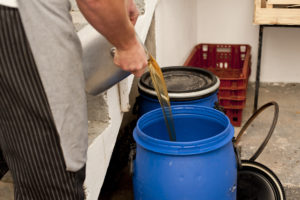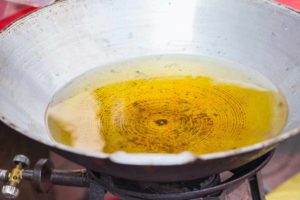Oils are used extensively in our daily meals, whether it be for light, tangy salad dressings or crispy, delectable deep-fried potatoes. They may alter the flavor, texture, and, naturally, the nutritional content of the food we eat. And it might be challenging to know where to begin when it comes to using the proper oil for the right kind of cooking given the enormous variety of oils that are now readily available in supermarkets. While using a dressing oil to fry food might overwhelm more delicate veggies and leave a bitter aftertaste for meat, drizzling the incorrect oils on a salad can make it mushy and flavorless.
Cooking is the main usage of avocado oil. Its color ranges from bright to muted green and its flavor and aroma are delicate, nutty and faintly avocado-like. This oil is excellent for cooking since it contains high levels of potassium, vitamins A, E, and D, as well as beneficial monounsaturated fats. It is ideal for all types of frying, including stir-frying, searing, and deep-frying, due to its high smoking temperature of 271 degrees Celsius. Cooking oils come in a variety of varieties, including sesame, corn, and coconut oils.

Unrefined extra virgin olive oil is thought to be the best olive oil money can buy. It is deep green in color and frequently has a complex flavor that is fruity, bitter, and mildly spicy. More of the natural vitamins and minerals contained in olives are present, and the original olive flavor is retained. However, at 160 degrees Celsius, it has a lower smoke point than many other oils. Save this tasty, healthful oil for cold foods, salad dressings, dips, and dipping new bread in.
Just keep in mind that while the flavor is vital, it is even more crucial that you pay attention to the ingredients, particularly oils. You can’t go wrong if you eat them in moderation. You’ve just finished frying up some delectable, golden-brown chicken cutlets, and the mashed potatoes are perfectly beaten, and the vegetables are steamed nice and crisp. It would be an understatement to say you can’t wait to put them on the table and start eating! But first, you need to decide what to do with the frying pan’s unused oil. Consider your decision carefully before pouring it down the drain. Rather contact NJ Oil Recyclers and hand over the leftover oil to them they will recycle it for better use.
Do’s of used cooking oil
Pour oils into a non-recyclable, reseal able container (like a glass jar) and toss the container in the trash. You should allow solidified fats (like bacon fat) to harden in the pan before scraping them into the trash.
Search for recycling companies like NJ Oil Recyclers if you have a large amount of oil to dispose of. If any oils can be composted, do so in small amounts. Dispose of oil in a plastic bag with other waste, making sure to tie it tightly closed. Each month, add little more than half a cup of vegetable oil to your compost pile, and then keep an eye on it.
What not to do with cooking oil
Never put used cooking oil or fat in the toilet bowl or down the drain. Although it is currently liquefied, once it cools it will harden and cause blockages in your plumbing. Don’t flush the oil down the drain with hot water. Many people think this is an easy fix, but no matter how you cut it, the result will always be clogged. Likewise, never pour hot oil straight into your trash can. The trash bag and occasionally even the container are completely consumed by the flames.
It is improper to pour hot oil into the trash without first allowing it to cool, although doing so is acceptable. Even so, to prevent a sticky scenario, we advise pouring the cooled oil into a sealable container before disposing of it. Why not reuse frying oil and grease instead of throwing them away? You can save bacon fat and frying oil in your refrigerator to use again when you’re ready to cook. As a matter of fact, salvaging bacon grease in particular for frying can produce some delicious outcomes.

Before washing pots and pans, make sure you wipe them down with paper towels. In this manner, you may be certain that no leftover oil is unintentionally poured down the drain. Additionally, you should watch how much oil you use when cooking because too much oil might be unhealthy. Coconut oil, which is popular in the southern states, is also high in palmitic and saturated fatty acids. Six out of seven reliable studies conducted to date have found that it increases LDL, the main cause of arterial blockages and poor blood cholesterol.
It seems that a lot of individuals do not think that coconut oil is harmful to the body, and they tend to base this belief on short, shoddy research that lacks scientific value. Widely available snacks like fries are manufactured using palm oil, which is high in saturated fat. It’s interesting to note that the same international corporations frequently use healthier oils when producing identical snacks and munchies for markets like the United States.
We have seen a growing trend in the liver’s shrinkage (fibrosis and cirrhosis), which is caused by the accumulation of all saturated fats in the liver. So, how do you maintain your health? Keep an eye out for the number of saturated fats, palm oil, and trans fatty acids on nutrition labels. More fresh fruit and vegetables should be consumed, and you should alternate and combine little amounts of healthy oils. Avoid using any oil more than once and reheating it. You may typically reuse your oil three to four times, tops. This is recommended since it will help you save money and the environment by preventing sewer obstructions.
For people who fry frequently, it is important to take into account the sort of food being fried, the frying environment, and the frying temperature. We need better and more robust research data and until then, we should decrease the intake of these oils. It is important not to use an excessive amount of oil. And it is also very important not to throw the leftover oil and rather call NJ Oil Recyclers to deal with the used cooking oil.



